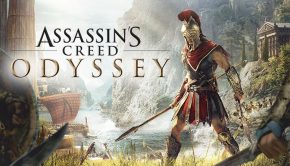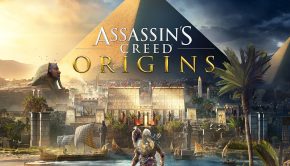Lorne Balfe Interview: Scoring Assassin’s Creed and Skylanders
Lorne Balfe has risen in the ranks to become one of the most successful composers at Hans Zimmer’s music production company, Remote Control Productions. In recent years, he has composed music for films such as Inception, The Dark Knight, Sherlock Holmes, and Iron Man, between scoring numerous independent films and television shows. He is also emerging as one of the game industry’s most eminent composers, having created scores for the Call of Duty, Crysis, Skylanders, and Assassin’s Creed series.
In this interview, Lorne Balfe compares the process of composing music for films and video games. He goes into depth about his experiences producing his latest game scores, Assassin’s Creed III andSkylanders: Giants, before giving an exciting glimpse into the future.
Interview Credits
Interview Subject: Lorne Balfe
Interviewer: Chris Greening
Editor: Chris Greening
Coordination: Beth Krakower
Interview Content
Chris: Thanks for taking the time to talk to us today, Lorne Balfe. While you are principally a film composer, you have been working increasingly on video game scores in the last few years. What led you to first start composing for the video games industry with your debut Call of Duty: Modern Warfare 2?
Lorne Balfe: Well, it was something of an accident really. I had actually worked on Battlefield 2 about three years before that for the composer Rupert Gregson-Williams. Call of Duty came under Hans Zimmer’s direction. I was working with him on a film at the time and he asked me to score this game with him as joint credit. It just happened really — it was just the same as if a film or television assignment had come along. There was no specific direction of wanting to do games, but it was one of the biggest franchises at the time, so it seemed appealing. And certainly, it turned out to be an interesting project.

Chris: It must have been an amazing project to have made your video game debut as a lead composer debut for. If I’m not mistaken, it sold over twenty million copies.
Lorne Balfe: Oh yes. In the first five days, it sold something like five million copies. It’s ridiculous!
Chris: Even bigger than most blockbuster Hollywood films, I think.
Lorne Balfe: Definitely. And unlike a film, it’s a game where people live and breathe it. So the game seems to go into your household for hours at a time. Whereas when you go to cinemas, you watch something for an hour and a half and walk away. The game gets into people’s whole lives.
Chris: Your music for Modern Warfare 2 and the themes for Crysis 2 tend to be very cinematic and Hollywood-flavoured. Did you notice any major differences when working on these games as opposed to the blockbuster films you normally score for Remote Control Productions?
Lorne Balfe: No. There’s no difference. The music in a game is still doing the exact same as what a piece of music does in a film. It’s got to help out the story and help to describe what’s going on in conjunction with the visuals. If there’s an action sequence in a film, it’s just the same as an action sequence in a game. So there’s no fundamental difference in scoring. Apart from the fact that, when writing for a film, you have lots of visuals to reference and are a writing to the events that are occurring during that action sequence. By contrast, you can’t do that during gameplay sequences, as the player can manipulate and change the sequence. There are more possibilities.
Chris: For the Skylanders games or the multiplayer mode for Assassin’s Creed: Revelations, you mostly created background music that looped during the levels. Does this give more freedom in the composition process?
Lorne Balfe: Sometimes it does, sometimes it doesn’t. In some games, you can decide the direction of a piece of background music. In others, there’s a strict description of what the music should be doing a two minute thirty playtime — there could be 30 seconds of pulse, then 20 seconds of big loud action music, and then back down in intensity. Either way, the process contrasts with film music, where you tend to sit and write to exactly what’s going. In a game, it’s not quite finished.
Chris: How do you find the soundtrack budgets for the games you’ve worked on compare with that of films?
Lorne Balfe: Games are just like films in this regard. A big budget is usually available for the music of a big game, just as it is for a major film. The relationship is exactly the same. That’s especially true now that the game producers aim to create soundtracks of the same high standards as movie scores. Game and movie soundtracks use the same orchestras, musicians, and mixers, so the whole end product is of exactly the same standard.

Chris: Now I’d like to take some time to focus on your most recent works, in particular Skylanders: Giants. Having recently reviewed your score for this game, I felt it really expanded upon the concept of the music for Skylanders: Spyro’s Adventure with rich, often quite dark compositions. To what extent do you agree?
Lorne Balfe: The word expands is a difficult one. The main reason I have a lot of fun on Skylanders is that there really are no rules. You can use the kitchen sink and it works! By the end of Skylanders: Spyro’s Adventure, we had figured out a fun, sonic musical world to work with. So this made it easier to try different things with Skylanders: Giants and offer little nods to different styles. I felt more confident to do some things completely different and I didn’t need to worry so much about things technically gelling with each other.
Chris: As you indicated, you integrated a lot of styles and moods throughout Skylanders: Giants, often within the same piece. Could you tell us about the compositional challenges of doing this? How do you pull it off as well as you do?
Lorne Balfe: Oh, I find it quite easily actually! I don’t focus very well on one thing at a time. One good thing with the Skylanders scores is that you’re able to incorporate very strange time signatures in conjunction with strong melodies. That’s not normally the case when you’re using strange time signatures, because you need to grab on to something. In addition, I often avoided using the orchestra as the prominent force in favour of dulcimers, banjos, and other unusual instruments. This drove the score through a bit. I kind of view it as a big bowl of soup with different ingredients in it.
Chris: In terms of the technological side, how do ensure that everything is so well-balanced and smoothly mixed in this soup-of-sorts?
Lorne Balfe: It’s pretty easy. You write while you mix, so you’re able to balance things, even if unusual instruments are incorporated. It starts changing when you incorporate live instruments and the mix obviously then changes. During the whole process, we try to record while the demos are still happening. That way, when you get to the end, we’ve pre-mixed it already.
Chris: One thing I noticed about the score is that it features a really strong Celtic undercurrent. What inspired this approach? Were there aspects of the game’s scenery that reminded you of your Scottish heritage?
Lorne Balfe: No, unfortunately. My heritage just seems to creep through once in a while and I can’t control it! I think that, when we started doing tracks like “Cutthroat Carnival”, it was clear that we were able to go a bit Celtic and piratey here. What’s more, when you’re dealing with the giants, there’s a whole mythology there based on ancient worlds and so a Celtic influence can work in this regard too. In the end, the Celtic influence is a another colour that, for some reason, seems to creep out of me all the time.
Chris: Were you closely involved in the process of presenting the soundtrack for stand-alone release?
Lorne Balfe: We never looked at the score as a stand-alone thing during the production process — I never thought of Skylanders: Giants as an album release. Our focus was making it work in the context of the game. It’s the same as film music and any other form of music for visual media. But if it can stand up by itself and people like listening to it separately, that’s an extra bonus there. It’s really nice to hear that a lot of people have enjoyed the music of Skylanders: Giants even independently of the game. I think it helps that the game was the type that could inspire music suitable for stand-alone listening.

Chris: I should probably move on to talk about your score for Assassin’s Creed III. Your score for this title takes quite a different approach to others in the series. Do you think this largely reflects the shift in setting for the game or the simple fact that you have a different musical aesthetic to Jesper Kyd, who composed most previous games in the series?
Lorne Balfe: It’s a different game. As with films, it you put a number next to a game title, that doesn’t mean it’s the same game. The story, character development, and whole concept of a sequel can change. Assassin’s Creed III is, visually and otherwise, far different from even Assassin’s Creed: Revelations that I scored last year. So musically, we were able to do something quite different with it and see what the results were. For one, the game is far bigger and more epic than the others in the series. As a result, we played with different intensities of the music — the visuals were getting bigger, so we kept trying to push the music too. The final soundtrack matches the size and grandeur of the game.
Chris: The main scenario of Assassin’s Creed III was a historic one set in the American Revolution. How did you capture this? Was authenticity important to you?
Lorne Balfe: I think this was one of the hard challenges. In this case, we knew we wanted to be quite loyal to what we were seeing and not necessarily be too electronic. I didn’t want to go down the road of having electronic drum loops in the Frontier parts, since it’s an alien sound. That said, I didn’t want to write that music would have been authentic to what would people listened to in the 18th Century. That would have been boring and we wouldn’t have been able to relate to it. Based on what they would have known, action music wouldn’t have been as vicious or as fast as we are exposed to these days. So it was a case of borrowing ideas from period, presenting them with a modern Western’s perspective, i.e. mine, and basically going for it.
Chris: Assassin’s Creed III features especially high-quality production values. What favoured your approach to blend instrumental performances with digital designs? What did a hybridised approach bring?
Lorne Balfe: A good example is the treatment of the chanting, which represents the world of Native Americans. But instead of incorporating regular chanting, it was possible to add a whole new dimension by manipulating the chants and making them like percussion. It takes things into another realm. Another thing is that this is a game that features different time periods — there was the period setting, but there’s also the modern scenario. That warranted the use of some electronics, but only in select places.
Chris: The main theme for Assassin’s Creed III is a striking and beautiful one. Could you tell us more about what inspired the theme and how you developed it?
Lorne Balfe: Well, the theme is always the hardest thing in a soundtrack, because you’re trying to sum up a legacy and a whole franchise in a short period of time. I had just come from trying to do that when handling the theme for Assassin’s Creed: Revelations. So in the case of Assassin’s Creed III, it was a very hard task that took a while.
Chris: I can definitely imagine that, given the game has so many different components…
Lorne Balfe: It’s a hard one, as the theme is supposed to encompass Assassin’s Creed III. It’s a challenge to represent all these different colours. I kept on coming up with ideas and spinning them back between the game developers and myself. The way around this is to try to get a really strong melody and then incorporate the different colours as the theme is fleshed-out. It was at this stage that I introduced, for instance, the chanting for the Native Americans and the Celtic fiddle parts to show the Frontier. It was more important for me to capture the different colours of the game, rather than tie the theme to a specific character.

Chris: Just last week, you presented the main theme for Assassin’s Creed III alongside the other Game of the Year nominees at the Spike Video Game Awards. Could you share some memories of this event? I imagine it was awesome to have been part of it?
Lorne Balfe: Oh yeah, it was absolutely fantastic. Mark Burnett, the long-time producer for the VGAs, came up with this idea. I’ve been working with him recently on the upcoming television series The Bibleand, through this production, he really observed how important the role of music is. As a result, he thought doing a medley would be a great opportunity to showcase some of the best games of that year. Getting them all into one performance was very difficult, given they all feature different tempos and styles. But I think it worked. It was a good process of bringing all these games together and emphasising the score component of them.
Chris: Between your works on game scores, independent films, and Hans Zimmer’s blockbusters, among others, you’re always on the move and have a lot to fit in. Just how do you manage it?
Lorne Balfe: The way soundtrack production works is different from what most people think. You don’t have one job every single day for half a year. Rather, jobs come in, then they stop for a period of time. In the ideal case, you’re asked to focus on a project for an extended period of time. But a lot of the time, the process is very staggered. You can work on a project for a week, then stop for a whole month when there’s nothing left to do. As a result, you’ve got to keep active otherwise you’ll literally stop writing. Working on games, films, and other types of visual media requires a lot of multi-tasking.
Chris: To finish things off, we’d be interested to hear your involvement in some recently released independent films, for instance the action movie The Sweeney?
Lorne Balfe: The Sweeney was a dream come true really. I always remember watching the television series as a child, even though I wasn’t really allowed to. I was a massive Sweeney fan and also a massive Nick Love fan — I had seen all of his films and absolutely loved them. So when I heard about The Sweeney, I knew I wanted to work on it and needed to be part of it. I worked very hard in pitching for it. As for the film itself, I think it’s a great British film. Despite not being made with lot of money, it can really stand up to big action films. It’s nice that it actually happened and worked — I’m very proud of it.
Chris: Provided you can discuss it, what do you have on the go at the moment on the film and video game front?
Lorne Balfe: On the games front, just two nights ago, we finished mixing the Assassin’s Creed III DLC that will be coming out next year. Film-wise, I just finished The Frozen Ground, starring Nicolas Cage and John Cusack, which will also be released in 2013. I’m also in the process of scoring two new video games. One game, I’m now on it for another year and a half — that’s a good example of a project that can last a long, long, long time, which you don’t necessarily work on every single day. There’s also another game that I’ve literally just started that will be coming out in the middle of next year.

Chris: Many thanks for your time today, Lorne Balfe. Is there anything else you’d like to say about your works, past and present? And do you have a message for readers around the world?
Lorne Balfe: Thank you so much too. You know what, I think you raised a good question about theSkylanders: Giants album standing alone as a release. As a composer, it’s always nice when people comment and enjoy the music. I do feel that, when doing games, television, and films, we’re doing it as part of a package and as part of a team. If I wanted to purely write my own music, I would write it and perform it at a concert hall. But for a soundtrack, it it works well with the visuals and as a stand-alone identity, that makes me very happy. It’s great to hear.
Posted on May 1, 2013 by Chris Greening. Last modified on February 26, 2014.














